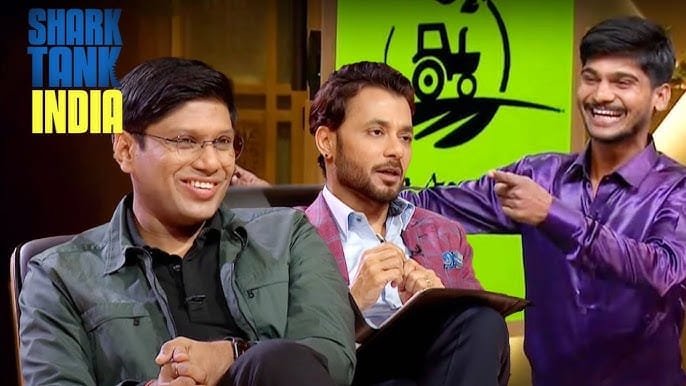In the world of entrepreneurship, investments are made with very high risks, and every venture does not see success. One such case is that of Peyush Bansal, the co-founder of Lenskart and also one of the most renowned investors on the popular show Shark Tank India.
The move by Bansal to back Jugadu Kamlesh, who had innovative agricultural solutions which seemed promising, has been subject to several setbacks which have led to growing doubts about the future of the venture.
In this report, we will delve deeper into Kamlesh’s journey from Shark Tank India to the present times and see why Peyush Bansal is regretting his investment.
The Evolution of Jugadu Kamlesh
Jugadu Kamlesh, whose real name is Kamlesh Nanasaheb Ghumare, became one of the most popular and recognizable personalities after his emergence on the reality show, Shark Tank India.
Indeed, he entered the sets with quite a drama. Kamlesh proposed a solution to a very common problem that farmers have faced, which is the arduous process of spraying pesticides on crops.
The traditional method of pesticide spraying was both labor-intensive and inefficient while exposing farmers to hazardous chemicals. Kamlesh’s hand-drawn pesticide cart was promising to ease this burden while keeping production costs affordable.
PLEASE FOLLOW US ON X/TWITTER FOR MORE SUCH INTERESTING UPDATE https://x.com/ThePhilox
IF YOU HAVE ANYTHING TO SHARE DO JOIN OUR TELEGRAM GROUP WE WILL RESPOND https://t.me/thephilox
Kamlesh pitched the pesticide cart prototype, which he said would save farmers time and reduce health risks. His passion was evident during the pitch, with a strong commitment to solving the challenges India’s farmers are facing.
Peyush Bansal was the only investor who saw the potential in Kamlesh’s idea and offered him an investment of ₹10 lakh in exchange for 40% equity. He also offered a no-interest loan of ₹20 lakh, which was a significant show of support.
The Vision Behind the Product
From the beginning, Kamlesh had a clear vision: he wanted to empower farmers by giving them tools that would make their work easier and more efficient.
He began his journey into entrepreneurship by noticing the struggles of farmers, especially his father, with the existing agricultural tools.
Inspired by the plight of farmers like his father, Kamlesh invented the pesticide cart, which he created in 2014 initially. However, it wasn’t until he appeared on the show Shark Tank India, that his product caught a national spotlight.
Kamlesh did not have the easiest of times. As soon as he got investment, he and his team worked on perfecting the design for the cart. They wanted to improve its performance, enhance its strength, and make it more economical.
The product was too costly to produce in bulk. Each unit was costing ₹40,000 to ₹50,000. It was impossible for the farmer community in India. But Kamlesh continued to design and brought the cost within a more acceptable range.
Slow Progress and Design Challenges
It has not been an easy road from pitching in Shark Tank to developing a product for Kamlesh. The problem of high production cost was the biggest challenge and took over a year of continuous work to refine the prototype.
He hired a designer from NID to work on the development of his product. This was an important step; it brought professional expertise into the process, so that the final product would turn out to be efficient yet affordable.
Kamlesh in February 2023 finally announced that the new version of the pesticide cart, now branded Bharat K-2, was ready for launch.
It had been through several iterations and design changes, and its cost had been brought down to ₹20,000 per unit, making it more accessible to farmers. Kamlesh also claimed that if produced in bulk, the cost could be further brought down to ₹15,000, which would really open up its market.
Even with optimism over the product, it had its launches repeatedly postponed. Mass production and logistics and marketing had all been more complex issues than the team initially imagined.
The final design was taking so much longer than expected for Kamlesh’s team, and there was still no place with infrastructure to manufacture at this scale. The product thus was not yet ready to be distributed in quantities many months after the launch was expected.
Peyush Bansal’s Emerging Concerns
As the delays continued, Peyush Bansal, who had invested a sizeable sum of money in Kamlesh’s startup, began expressing his concerns.
Bansal had always been an entrepreneurial enthusiast who liked to focus on promising innovators and entrepreneurs, but even Bansal could not deny the building challenges that the venture presented for Kamlesh.
Now, it seemed that though Kamlesh’s product has potential, it may not be able to generate any returns that Peyush had wanted.
While Peyush continued supporting Kamlesh, always advising and strategizing his design, it became pretty evident that the product did not have the potential for high-volume success in this particular form.
Even multiple revisions of the design in hopes of reducing production cost would not be able to salvage much, given the painstaking nature of development and access problems to farmers in out-of-the-way areas .
Also, when seen as a part of the history of other successful businesses in which Peyush invested like Lenskart, where there is a tremendous growth rate, his efforts to make Kamlesh succeed were all the more contrasted.
Peyush always had an eye for a business that can grow up to a large extent from the very beginning, being an investor who made excellent investments. Kamlesh’ was clearly on no roadmap toward profitability.
The Monetary Cost of the Investment
One of the main reasons a person like Peyush Bansal would regret his investment is through the financial impact.
Now, ₹10 lakh on a 40% equity stake was a reasonable thing to take at that time as the growth was slow along with product launches delayed well beyond the expected revenue run rate of a successful investment on Shark Tank.
The no-interest loan of ₹20 lakh further deepens the financial commitment of Peyush, without any immediate returns.
Unlike Beardo and BOAT, Peyush’s other startups, Kamlesh’s venture has not picked up as much as it should have. Those have grown very fast, achieving significant sales figures and hence being highly profitable investments.
His venture has been experiencing delays and has not been able to scale up in any manner, which makes Peyush worried about the future of the business in the long run.
What Future Holds for Kamlesh and His Startup?
Despite all this, Kamlesh does not give up. He says that he is still hopeful that once the product is launched fully and there is effective marketing, it is going to revolutionize how farmers work in India.
He continues working on new products that might benefit the farmers while he faces all these difficulties.
For Peyush, the future of his investment depends on whether Kamlesh can finally bring his product to market and achieve the scalability needed to turn the venture profitable.
While the startup has faced numerous hurdles, there is still a chance that Kamlesh’s persistence and innovative mindset will pay off in the long run.
The Hard Truths of Startup Investment
Peyush Bansal’s story with Kamlesh and his company reminds one of the nature of investments in startups. One may be very excited about and even promise a great success by an investment, but one knows that most startups experience problems that one could never imagine, which will put them behind schedule and ultimately hurt profitability.
Peyush might well be one that he wishes he had never invested in, considering the slow growth and no return from the investment. However, the startup world is never a clear path; it presents lessons learned from such ventures and plays a big role in contributing to future success.




